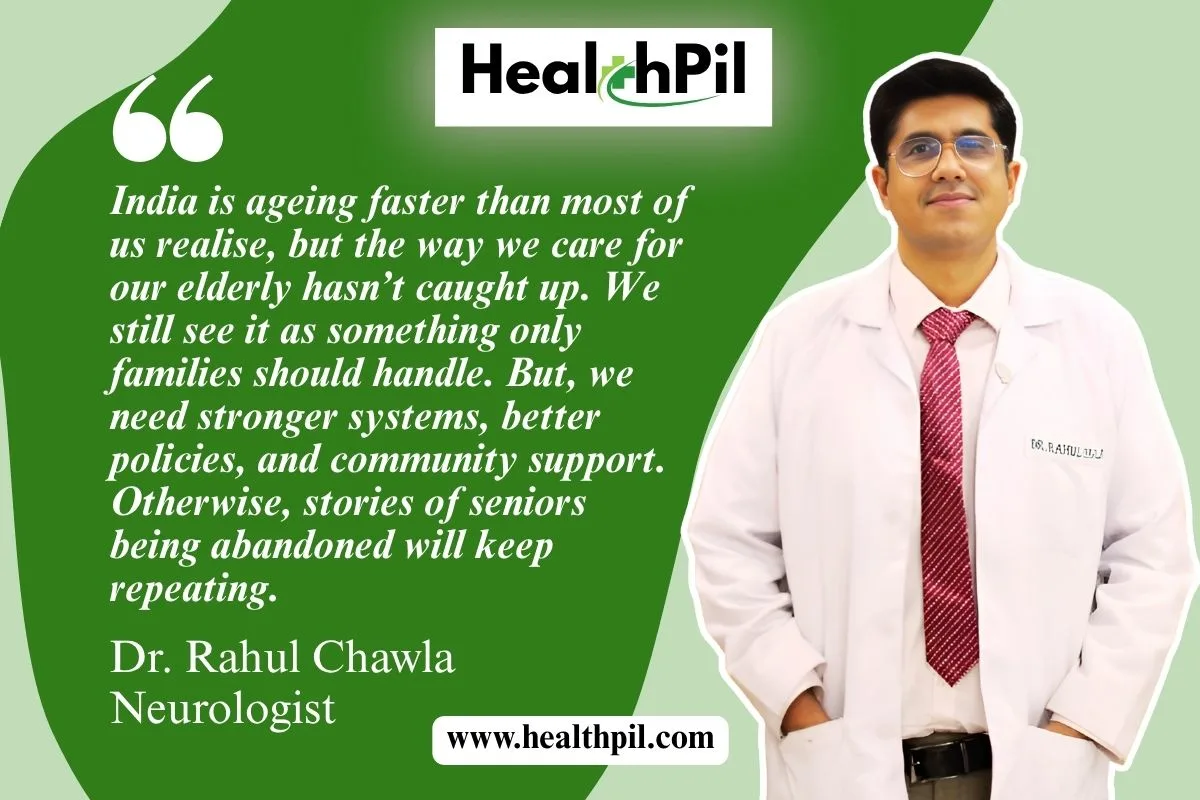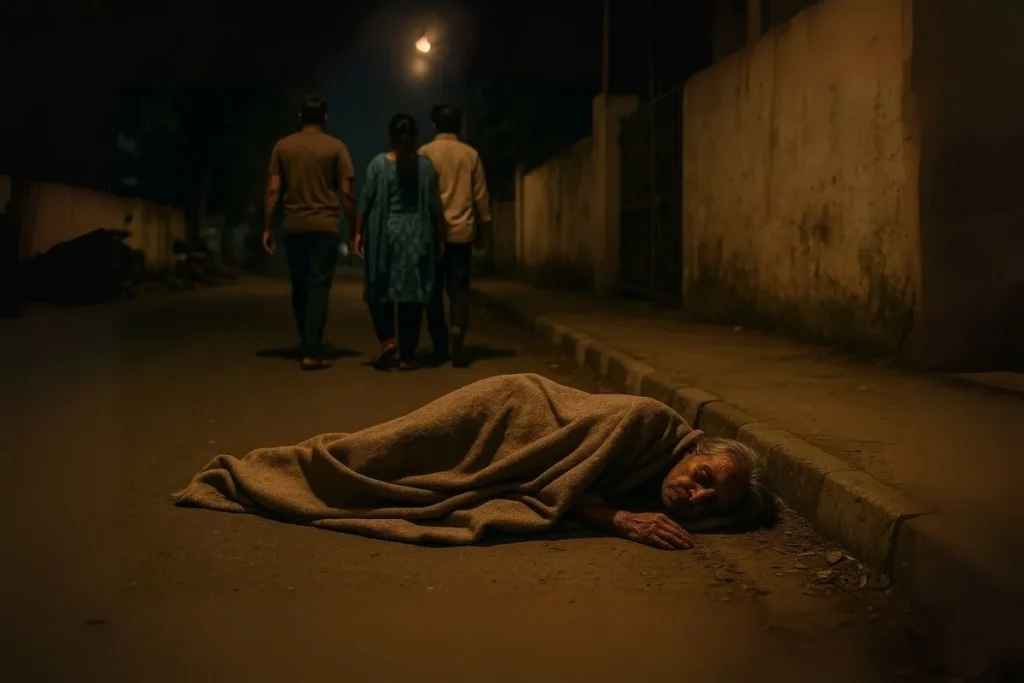An elderly woman battling with cancer was abandoned on the roadside by her own family. Studies show nearly one in four senior citizens in India face abuse and neglect. Is there anything that can be done to change this?
In Ayodhya, an elderly woman who was reportedly battling cancer was left by her family on the roadside in the early hours of the morning. CCTV footage shows relatives helping her lie down on the pavement, placing a blanket over her, and then quietly walking away. Every year, thousands of Indian seniors face abandonment or neglect. According to HelpAge initiatives, up to 25 to 35 percent of older adults report abuse or neglect, with some studies showing rates of physical violence or neglect impacting one in four elders in certain communities. Let us explore why our elders are being neglected and abused and whether meaningful solutions exist.
India is growing older faster than most of us realise. By 2050, one out of every five Indians will be above the age of 60. That is hundreds of millions of elderly citizens, yet we do not have a proper system for what happens when people age, fall ill, and need help. We do not even have a national policy that covers home-based elder care, and most public health programs are still focused on younger populations.
Why Are Elderly Being Abandoned?
There is no single reason. This is the result of decades of social change, urbanisation, and shifting family structures. Families are now getting smaller. Children are moving away for education and jobs, and many settle in other cities or even other countries. The joint family structure that once allowed grandparents to age surrounded by people is disappearing. Nevertheless, conversations about money, health, and ageing are avoided in most homes. Parents do not want to “burden” their children by asking for help. Children often feel guilty for not being there, so they avoid asking hard questions.
On the other hand, healthcare is getting expensive and even more so is end-of-life care. Although, it is uncomfortable to say, illness can become a calculation of cost for some families. Then there is the system itself. We still think of ageing as something that happens “inside the family.” But what happens when that family cannot, or will not, take responsibility?
Dr. Rahul Chawla, Neurologist and founder of HealthPil, puts it,

“India is ageing faster than most of us realise, but the way we care for our elderly hasn’t caught up. We still see it as something only families should handle. But, we need stronger systems, better policies, and community support. Otherwise, stories of seniors being abandoned will keep repeating.”
What Needs to Change?
The answer is not one thing. There are many things that need to come together.
Affordable, dignified care homes
Right now, in India, “old-age homes” carry a stigma. People think of them as sad, lonely places where people are sent to be forgotten. That perception needs to change. We need more community-style care homes that are not punishment or exile, but safe, and affordable spaces where elders can live with dignity.
Community-level support
Not everything needs to come from government policy. Sometimes the difference is as simple as neighbours noticing. Resident associations, local volunteer groups, and even informal check-ins can save lives. A daily phone call, a weekly visit, or a list of elderly residents who live alone in a society these simple things can prevent tragedies.
Emergency response for seniors
If an older adult living alone collapses in their home at midnight, there is almost no system in place to respond quickly. We need helplines that work, local responders, wearable alert devices, and neighbourhood-level volunteers who can reach in time.
Legal protection against neglect
India does have a Maintenance and Welfare of Parents and Senior Citizens Act. On paper, it makes it a legal duty for children to support their parents. In reality, it is barely enforced. People abandon their parents without consequence. That has to change. There needs to be accountability for neglect and abandonment.
Honest conversations with families
Having this conversation might be the hardest thing of all. Families need to talk about ageing. Parents need to be able to say, “I will need help in the future.” Children should be able to say, “Here’s what I can do and here’s what I cannot.” It might feel uncomfortable, but avoiding it only creates more difficulties later.
Why Elderly Care Plan Matters
India is not ready for the ageing that is coming. By 2050, 20 percent of the country will be over 60. Right now, most government health resources are focused on maternal and child health, that is important, but it leaves geriatric care on the sidelines. Private elder care is growing, but it is expensive, inconsistent, and often out of reach for the average middle-class family. As a result, families are left to manage ageing alone.
What You Can Do Now to Help the Elderly
You cannot fix the entire system by yourself, but there are things you can do today for your own parents, your neighbours, and elders in your community.
● Check on your elderly neighbours every now and then
● Don’t wait for a crisis to discuss what kind of help might be needed. Talk often and build a relationship.
● Prepare emergency plans. Keep ambulance numbers, neighbour contacts, and medical details in one place.
● Recognise the signs of stroke, heart attack, dementia, knowing what to do and timely action can save a life.
Every story like the one in Ayodhya should remind us that ageing is something we will all face one day. Change will not come from laws and policies alone, it will come from the way we, as families and neighbours, choose to care for our elderly. Even the smallest act of kindness or responsibility can mean a senior is not left helpless, and that is where we need to begin.
How HealthPil can help
At HealthPil, we see these situations far too often. Seniors who don’t get to the hospital in time after a stroke. Families abroad are trying to coordinate care from thousands of miles away. Parents left to manage illnesses alone because no one realised how much help they really needed.
We try to be part of the solution.
● You can ask questions for free on HealthPil if you’re worried about a parent’s health.
● You can book online consultations with doctors for your parents, even if you live in another country.
● Our team shares guides and advice on what to do in emergencies, how to plan care, and how to make ageing safer and more manageable for families.
Disclaimer
This article is for awareness. It is not medical advice. If you have ageing parents, grandparents, or neighbours living alone, take a step today.

